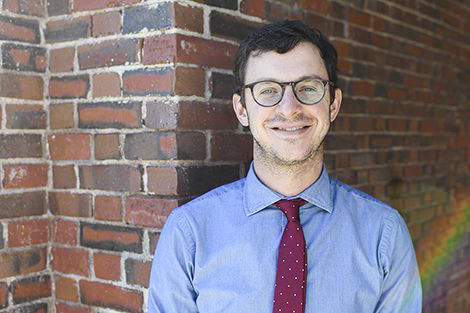
c/o Friends of the Wesleyan Library
On Monday, Sept. 20, Assistant Professor of Government Justin Peck was greeted by an eager crowd of both Middletown residents and Wesleyan students when he walked into Russell Library for his talk, “Progress, Preservation, and the Constitution After Trump.” This annual Constitution Day event was organized by Friends of the Wesleyan Library in conjunction with Russell Library. At the University, Peck’s expertise includes the presidency, Congress, and American political development.
He began the talk by addressing one of the fundamental questions pertaining to how democracy should work: Who trusts the government? According to Peck, the answer is disheartening. Gallup polls have shown that as time passes, Americans’ trust in the government has steadily diminished. Peck touched on many governmental issues that might give reason for this, focusing on extreme polarization in Washington and the government’s inability to deal with polarizing issues, such as distribution of funds and responses to natural disasters, like the recent hurricanes that have traumatized and rocked the livelihoods of many Americans. In short, he argued that the U.S. government is not doing the best job of supporting the nation.
Peck went on to argue that political progress today is stymied by conflicting understandings of the Constitution. He made the important distinction between constitutional faithfulists and constitutional skeptics.
“[Constitutional faithfulists] think that the Constitution is our salvation, and that progress demands that we affirm things associated with the Constitution,” Peck said.
This mentality, he explained, is one that weighs down our government, and he argued that we instead should open our minds to the beliefs of constitutional skeptics. Constitutional skepticism is the belief that our government should not continue to strictly operate by the words of the Founders when they created the Constitution. He insisted that we are making a huge mistake by subscribing to a constitutional faithfulist mentality.
“[It enables us] to just fall back on orthodox positions in the face of a political movement that is doing a successful job questioning and chipping away at political orthodoxy and constitutional orthodoxy that has been in place for most of the 20th century,” Peck said.
Peck added that both former President Barack Obama and President Donald Trump are both, in some ways, constitutional skeptics, as each one has been guilty of claiming more power than the Constitution technically grants them. He brings up these specific politicians to demonstrate that belief in constitutional faithfulism or constitutional skepticism is not divided along party lines. Elected officials from every political persuasion have been found guilty of exercising powers that push the boundaries of the Constitution in the direction of legitimate change. Peck posits that we should set aside our political differences and instead begin to focus on the opportunities a constitutional skeptic mindset might yield.
But Democrats, in an effort to rally a certain cause, Peck explains, often use constitutional faithfulism to bolster their arguments.
“Medicare and Medicaid, they are the same idea; they are life savers,” he said. “I’m not arguing that we should do away with it. I’m just saying that there is no meaningful progress made by appealing to preserving social security. That is an appeal to the status quo.”
Though Peck continuously expressed that he does not see any fault in these social security programs, he used them as an example of how our government abides by a strict constitutional guideline, one that leaves little room for progress.
Peck also took issue with the way people criticize Trump by depicting the way he challenges institutions like NATO as a threat to institutional order. He argued that such institutions should be challenged in order to progress as a nation, for such institutions are products of an imperfect government.
“It may be the case that attacking NATO is not a good idea, but the political argument that these things are beyond question and that they are sort of mystical and that getting around that or getting rid of them is going to put at risk global and all of civilization, is exactly the type of argument that those in the 19th century were making about the gold standard. And we need to think about whether it is rational to be making this type of claim.”
But Peck isn’t void of hope. He believes that if Americans are able to develop a new understanding of the Constitution, if they are able to understand it as a dynamic and ever-changing document, progress might be possible. Americans are capable of learning and self-governance, but the Constitution, he insisted, must be questioned in order to realize that potential.
Calia Christie can be reached at cchristie@wesleyan.edu.